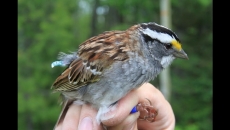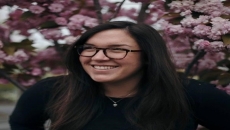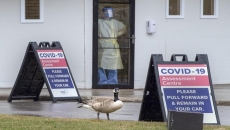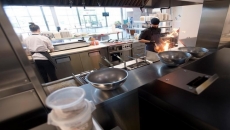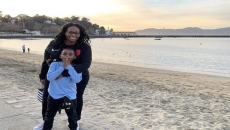As Laura Duarte swipes through a seemingly endless stream of suitors on Tinder, she's not only looking for a romantic spark, but COVID-19 chemistry.
In the early days of the outbreak, Duarte ruled out the duds on online dating apps who flouted lockdown rules by proposing in-person meetups.
Since then, many parts of Canada have eased social distancing restrictions to partially reopen bars and restaurants. Duarte said Toronto's dating scene is heating up this summer, and the prospect of a real-life rendezvous no longer seems like such a remote possibility.
Still, the 25-year-old said the novel coronavirus has compounded the complications of modern courtship to the point that she's yet to find someone who's worth the risk.
"There's so many intrusive questions that you have to ask," Duarte said.
"Have you been with anyone else? Have you been tested lately? ... Are you wearing protection? Are you wearing a mask?"
Duarte is among the singles who say the pandemic has warped romantic rituals to turn casual dating into a serious commitment.
But sex is an important part of physical and mental wellness, and the desires of those looking for casual hookups should be acknowledged in public health messaging, advocates say.
For some, COVID-19 concerns have forced thorny conversations about intimacy and exclusivity before meeting face-to-face.
Awar Obob in Halifax, who is non-binary and uses the pronouns they and them, said they've encountered the full spectrum of romantic risk tolerance while exploring online dating apps, but none of these potential mates have proved to be a match.
"There are people who have thrown caution to the wind and say, 'Let's meet up right now,'" said Obob.
"Then there are the people who are so cautious that they're like, 'I'm not sure why I'm even on here.'"
Experts say there may be benefits to opening up communication about COVID-19 compatibility, and even public health officials could stand to be more candid about negotiating the forces of love and lust during a pandemic.
Asked if there was any way for singles to have sex safely this summer, Canada's chief public health officer told reporters that standard social safety precautions should extend to amorous encounters, but admitted it was her first time fielding the question.
"I'm not a dating expert," Dr. Theresa Tam said at a news conference last Friday.
"I don't know what to say except (proceed) carefully, slowly, like all other advice on reopening social and economic activities."
The first tip Tam offered was "don't date if you're sick," noting that people can carry the virus even if they're not showing symptoms.
She said "singular dating" is preferable to playing the field, so it's probably best to get know someone virtually before meeting up in person.
For first date ideas, Tam suggested picking a spot outdoors at a safe distance from others, such as a picnic in the park.
The novel coronavirus is spread through respiratory droplets, so intimate contact, such as kissing, is a potential route of transmission, said Tam.
"This is a serious social contract you have with someone."
Tam proposed a "checklist" to help daters consider how seeing someone new could have ramifications for their social circle, particularly vulnerable family members.
Winnipeg sex therapist Reece Malone said many daters are already putting this concept into practice by asking COVID-19 screening questions to gauge each other's comfort levels.
Some of these topics can be touchy, Malone acknowledged, such as probing about a prospective partner's recent sexual history or what kinds of physical contact they'd be open to.
But he said the process of getting to know someone before deciding whether to take things to the next level tends to pay off in the long run, both in terms of personal safety and relationship prospects.
"It's an opportunity to increase your communication, as well as ask curious questions without the pressure of even having to meet immediately," Malone said.
As COVID-19 brought the breakneck pace of high-speed dating to a virtual halt, Malone said many have come to appreciate the appeal of prolonged long-distance courtship, finding creative ways to fan the flames of desire from afar.
"This is bringing us back to slowing things down, getting to know somebody and expanding the quality of your relationship with that individual."
However, delayed gratification isn't for everyone, Malone noted. Sex can be an important piece of a person's overall health and well-being, he said, and for some, serves as an outlet for stress during a time of extraordinary upheaval and disconnection.
Matthew Numer, an associate professor of health promotion at Dalhousie University, said in the first few months of the outbreak, public health officials took an abstinence-only approach to sex outside of live-in relationships, as characterized by the common refrain, "you are your safest sex partner."
While that maxim may be true, it's not always realistic, Numer said.
"Good luck in the fight against hormones," he quipped.
We need look no further than the HIV/AIDS crisis to see the perils of stigmatizing sex during a pandemic, said Numer. And because the novel coronavirus is so transmissible, it's all the more important to offer people tools to reduce their risk of contracting COVID-19, he said.
These harm reduction strategies should be tailored to each region, said Numer, but he expects common themes will include promoting frequent testing and wearing protection.
From public messaging to private exchanges, communicating the importance of consent will be crucial to keeping people safe, said Numer.
COVID-19 has normalized setting limits on physical contact without verbal permission, such as handshakes and hugging, Numer said. He hopes those habits will carry over to more intimate interactions, both during the pandemic and beyond.
"We need to acknowledge that we're sexual beings and relationships are important," he said.
"People do need connections, so how do we make that happen when we can't always be physically connected?"

